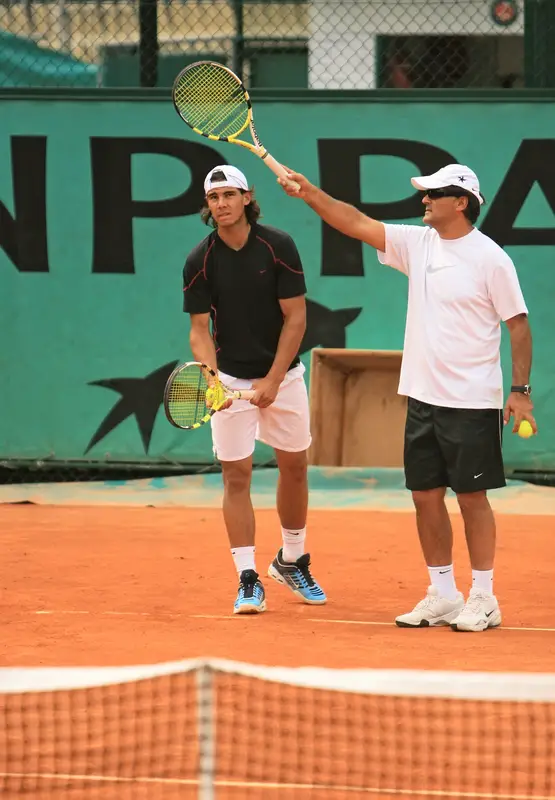- Be Positive
- Adapt to Each Individual
- Understand Students’ Needs
Your Guide
 Gavin Davison
Gavin Davison
Coaching tennis is something that almost anybody can get involved with.
However, only a small percentage go on to become what I would consider being ‘good or great coaches’.

Having worked as a full-time coach myself in the past, I’ve seen evidence of this firsthand.
There are many people who become qualified as a coach, and then try to follow a supposed blueprint for coaching the game.
This has always been a bit of a mystery to me, as there is no exact way to coach tennis that will suit all people.
However, some have obviously found an approach that works for most, such as the great Nick Bollettieri.
For that reason, I’ve included ADAPTATION as one of the MOST IMPORTANT TRAITS of any decent tennis coach.
And as you can also see, positivity and understanding the student are the two others.
Sure, there are a few more things to being a great tennis coach than these three traits.
But I firmly believe that all good coaches need to demonstrate EFFECTIVE ABILITIES in each of these three fundamental areas.
So now that these have been highlighted, I think it’s time that we took things a little deeper.
Becoming a Great Tennis Coach
One of the biggest misconceptions people have about becoming a decent tennis coach is that you need to have been a great player to do this.
The evidence is everywhere that this just isn’t necessary.
Look at guys such as Richard Williams or Toni Nadal – both guys never played tennis at an ELITE LEVEL, yet they have produced some of the greatest players of all time.
In fact, I found this cool video of Toni Nadal giving a Ted Talk, and this gives a real insight into the mind of this truly awesome coach (video is in Spanish with English subtitles):
Of course, you’ve then got other guys who have indeed played tennis at a pretty high level.
But in my experience, it’s not always your own level that dictates whether you would be a good coach.
It’s how you can explain the game to a student and get them to understand and improve, and this is different for every individual.
Coming back to the three traits now, let me explain why they are so important.
1) Positivity
When it comes to positivity, I’d like to take you back to your high school days to emphasize why this is so important.
Think back to your class schedule – which classes did you enjoy the most?
Did you enjoy classes where the teacher had a ton of knowledge but presented things in a rather boring and methodical manner?
Or did you prefer the classes with an upbeat, passionate teacher who explained things in a positive manner?
I would hope that the answer is the latter!
And this also holds true when it comes to tennis coaching.
Being a great tennis coach all STARTS WITH:
- YOUR PASSION FOR THE GAME and
- HOW POSITIVE YOU CAN BE when teaching people to do it.
You have to be able to explain what the student needs to do and demonstrate this in a way that is exciting, not in a way that is somewhat robotic.
Believe me, I’ve seen coaches go through the motions out there on the court.
And I always liked to think that if I was ever bored or disinterested when teaching a class, then this certainly means that the students were bored!
Of course, creating a positive environment is also critical if you are to get the best out of your players.
2) Adaptability
If I am to be completely honest, I feel that the way in which tennis is taught to most people is FAR TOO GROOMED and robotic.
I’m not denying that there are certain fundamentals that need to be taught in tennis in order for an individual to improve and REACH THEIR POTENTIAL.
This is common knowledge.
But I firmly believe that you need to adapt to how an individual prefers to play the game and then style your coaching approach to suit.
For example, if you are teaching a student who loves to hit the ball flat from the baseline and this is one of their main strengths, it would not make sense to then focus so much on trying to get them to hit heavy.
In addition to switching your focus in relation to the individual’s strengths and weaknesses, you need to adapt how you actually explain things as well.
Some people are very visual learners, whereas some are perfectly okay with you just explaining how things are done.
So on that note, you need to be flexible and adapt your approach until you find a style that is getting the best out of the individual.
3) Understanding of Student’s Needs
It goes without saying that not everyone you teach wants to become a Wimbledon Champion.
In fact, depending on where you actually teach tennis, you may never teach someone who wants to become a professional.
So for that reason, you need to make sure that you actually understand what the intentions are for your students.
It’s important to keep in mind that some people receive tennis coaching purely because they want to get some exercise while socializing at the same time.
And if you have a group like that, you will obviously approach the session differently than if you were coaching aspiring juniors.
On a more personal basis, if you are teaching private lessons, it’s important to ask the student what they want to work on.
I always found that this is the best approach rather than simply picking what I think is important and then hammering it home.
By taking this approach, the individual will get the most out of the session, and they will leave the court with the knowledge that they worked on what they wanted to – not what you felt was necessary.
Do you have anything to add when it comes to teaching tennis in the best possible way? If so, feel free to add your thoughts in the comments section.


